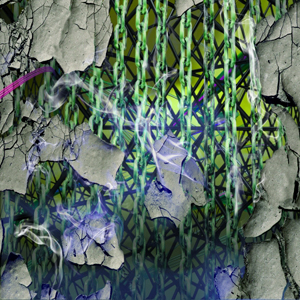Nguzunguzu Warm Pulse EP
Nguzunguzu is an outfit that has always been hard to pin down. The Los Angeles […]

Nguzunguzu is an outfit that has always been hard to pin down. The Los Angeles pair surely lands somewhere along the Night Slugs lineage, but has nonetheless always come to the table with a unique perspective, folding influences from modern R&B, coke rap, juke, dubstep, G-funk, grime, trap, and even new age into its sonic formula. The resulting productions fit the mold of what has become a largely Stateside take on bass music, one that offers more pieces of half-time boom-bap than pounding club affairs, yet still injects those efforts with neverending skitters, chopped-and-pitched vocals, and rolling kicks and snares. Fortunately, Nguzunguzu has always managed to approach its craft with a touch of eccentricity, a tendency which appears to be alive and well on its latest outing, the Warm Pulse EP.
Unexpectedly, this EP does not come via Fade To Mind—the predominantly Kingdom-run label that counts Nguzunguzu as part of its core—but instead on fellow LA imprint Hippos in Tanks, which has served as a jumping-off point for Laurel Halo, Hype Williams, and more in recent years. With that in mind, it seems Nguzunguzu could have taken the opportunity to explore more indie-minded or experimental productions, or maybe even invited some guests to mark its appearance on a label slightly outside of its normal territory. Fortunately though, the duo does no such thing, in the end delivering five songs that, although a bit darker and spookier than much of the group’s other work, is true to its established sound (which clearly still has plenty of fruitful space left to explore). To its credit, Hippos and Tanks’ A&R shares responsibility for this wise choice, as Nguzunguzu, in a recent interview with XLR8R at this year’s Sónar festival, pointed out that the label had granted the pair total freedom in putting together the EP.
As such, the Warm Pulse EP should be mostly familiar fare for anyone already acquainted with Nguzunguzu’s established catalog. All but one track here operates around the 130- to 140-bpm range, cutting the tempo in half with heavy, half-stepping kicks and claps (and the occasional snare) as the gaps left in between are filled with stuttering hats and shakers, space-age FX, and lush combinations of ’80s-reminiscent bells and pads. There’s also the occasional vocal sample, which, it should be said, is never the focus but is more often used for its rhythmic properties, as opposed to its melodic or lyrical content. The combinations that hit best are “Smoke Alarm” and “Drop Cage,” two tracks that beautifully draw connections between cosmic beatsmithing and adventurous club music with just the right touch of gangster lean. While “Smoke Alarm” keeps its sights on gliding synth melodies, 808s, and finger snaps before drifting off into a looser swirl of delays and reverb, “Drop Cage” is more aligned with the Fade to Mind sound, pitting machine-made FX with a clattering procession of claps and a main synthline that could have been sampled from the X-Files theme; if not, it surely must have come from the same keyboard patch.
It seems that if one was to try to assess the differences between America’s slant on bass music and that of its counterparts across the Atlantic, one of the main points of distinction would be that US producers tend to display the influence of commercial hip-hop a bit more prominently. Often, this ends up contributing to a production’s downfall, as it can often seem like a put-on. (A guy in his bedroom chopping up Aaliyah samples in front of a computer doesn’t exactly scream “street” in the most genuine of ways.) Somehow, Nguzunguzu has continually evaded this pitfall, crafting tunes that have as much for the lean-backers and the head-nodders as they do for the dancefloor crowds. In the process, the pair has also hit on what makes the bass-music hybrid so alluring; by connecting the dots between various club-music genres, Nguzunguzu continues to invite more people of different tastes to share in the experience.

